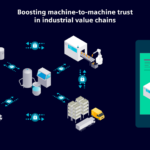ASIA ELECTRONICS INDUSTRYYOUR WINDOW TO SMART MANUFACTURING
New Bosch, AWS Partnership Digitalize Logistics
Robert Bosch GmbH and American cloud provider Amazon Web Services (AWS) have partnered to improve efficiency and sustainability in the transportation and logistics industry. Accordingly, their plan is to offer logistics companies and freight forwarders across the globe quick and easy access to digital services.
Particularly, Bosch and AWS will offer support for topics ranging from capacity utilization of commercial vehicle fleets to monitoring goods flows to order processing – all from a single source.
In the partnership, Bosch will be responsible for developing and operating the logistics platform, the core of which is a marketplace for digital services. Meanwhile, AWS will contribute its comprehensive cloud offering and expertise.
The platform will facilitate smooth interaction between a variety of services and data. This will enable transportation and logistics companies to benefit much more from the opportunities of digitalization.
The marketplace will also be open to all digital logistics services providers. For example, industry and consumers will benefit from the initiative because of greater reliability and transparency in goods and parcel delivery.

Greater Efficiency Through Increased Digitalization
“The transportation and logistics industry is the backbone of the global economy. In the years ahead, it will have to shoulder continuously increasing transport volumes for goods and commodities while simultaneously reducing its carbon footprint. In collaboration with AWS, we want to help the logistics industry with this. We aim to ring in the future of the industry and drive forward its digitalization,” says Sandeep Nelamangala, Executive Director, Bosch Limited, and Executive Sponsor of logistics platform business at Bosch.
Meanwhil,e Kathrin Renz, Vice President for Business Development and Industries at AWS noted developing hyperconnected transportation functions is one of the most complex technical challenges at present. For that reason, Renz said they are working with Bosch to master these unique challenges.
“The digital marketplace will enable logistics customers to quickly transform their business into a fully digital end-to-end value chain. Customers will benefit from the tools, frameworks, and modules we offer for digitalization, in addition to improving the sustainability of their transportation processes,” said Renz.

Addresses Challenges
The transportation and logistics industry has been booming for years. During the Covid-19 pandemic, online orders and parcel deliveries saw another sharp increase, giving the industry a further boost.
By 2030, global goods transport will grow more than 40 percent, and by 2050 this figure may exceed 145 percent. This growth is hitting a market that is highly fragmented globally – as well as struggling with various areas of inefficiency.
With its logistics platform, Bosch aims to provide a key solution for many of the challenges facing the transportation and logistics industry. The advantage of this platform is that it will create an entire ecosystem and a software environment in which freight carriers and forwarders can select, book, and execute different providers’ services to meet their specific needs.
In addition, the platform also allows for easy integration of applications that are already relevant to the market, for instance, in transportation management systems. Thanks to shared usage of data that is available through the telematics systems in commercial vehicles, for example from fleet management. For that reason, it is also possible to link and allow interplay between different services from different areas. This makes it easier to leverage synergies.




